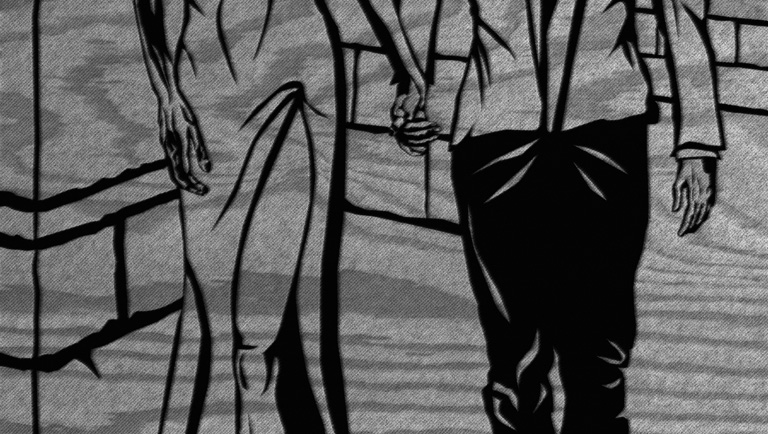
The Garden of Forking Paths
I remember it was in Geneva where I first met him. We sat not too far from one another—his assistant, an attractive woman named Maria, was with him and helped make the selection of something to drink through the customary consideration of a menu. While blind, he knew the menu intimately, so the ritual was somewhat meaningless. At the time, I was surprised they were not ordering maté, but rather coffee, which I was also drinking. We fell to discussing books and my immediate post-adolescent appreciation for Schopenhauer. Then as now, much of it had to do with Schopenhauer’s clear style—the more pessimistic aspects also found an appreciative home in my burgeoning cynicism and misanthropy.
He said I would have to “take care of that later” with Ms. Ludenow. Both the action and the prepositional phrase were mysteries at the time. “Unless you decide not to, in which this small pinch in the Möbius strip will gold back and disappear for I am not alive at the time when Jeffries slipped through,” he said.
I left and thanked him, determined to read a few of his books. The rotation of the earth turned Geneva just so as we all orbited Sol (I had not yet traveled to Tlön), we specks of dust on the Earth’s surface moved within and thought about the Golden Hour of light. This occasion of sunlight also meant that evening was coming, and I wanted to return to my hotel. Upon the doorknob was a ribbon the color of aubergine and the ne pas déranger sign. I had not put it there. I heard John Coltrane playing through the door. Later, these clues became focal points of recollection. Odd, how we remember these ‘little things’ when putting together a picture of importance in our memories.
That was at some point in the late 1970’s. The Junta still ran Buenos Aires and Argentina, which is also where Ms. Ludenow met him.
“Even a middling writer must be a great reader. Otherwise you are wasting our time. You cannot harvest the rich hybrids of fruit, stalk, leaf, and stem around you in this garden. Instead, you assume the ludicrous poses of failed autofellatio—failed because you are inflexible. The regal unfolding of organic writing flows out from one channel—irrigation ditch is monstrously cacaphonic; it sounds like some moist disease of the skin—and into another. I liken it to a garden of forking paths that has been inundated by floodwaters. The paths are there in pretty stone pathways but are somewhat meaningless by virtue of the three-dimensional properties of aqueous submersion.
The Circular Ruins
The Metaphorical Meaning of this story hits close to home, a threateningly destructive metaphor in itself, all the more ironic since this is a story of creation. The story is an answer, a method for writers—not authors—of how we create Tulpas or Golems.
I thought about this for a while and wondered if we had read two different stories, which is the case even when the text remains the same.
“That is always happening, David.”

She often corrects me. In the beginning, the corrections were often harsh and judgmental. As our relationship has softened in the progression of our age, we have become so comfortable that neither of us knows who is the Old Dog is and who is the Warm Fire. The Cold World Outside (frequently rainy) remains the same.
What appealed to me was that “The Circular Ruins” read like an adventure story. Borges was a devotee of Sir Arthur Conan Doyle and Edgar Rice Burroughs.
There is the sensuality of the figure laying in the Jungle. It reminds me of Angela Carter, which should really come as no surprise. They are both children of Carroll, whose work has always terrified me: cutting off heads, genocides of oysters and the Jabberwock. These are the simple forms of human cruelty that Alice Liddell, as an ordinary human child, would carry in her soul. Writ large, they become the florid and beautiful abominations of The Passion of New Eve and the Infernal Desire Machines of Dr. Hoffman.
The Card
Before I mention the Card, I should say I have owned three copies of Hurley’s translations (1998) of Borges’s Collected Fictions. One copy I loaned to a friend who appropriately disappeared at some point near the turn of the Millennium. I didn’t mind. For some reason, I felt that while I was not sure about my friend, the Book itself exists somewhere and is peregrinating with good purpose. I have since bought two more to make sure I have one at home and another at work.
(Note: during the Covid Year of 2020, I actually moved the work copy of Collected Fictions home as well. I’ve found it useful to have about.)
I don’t know how it got there. Know that I lived alone. That is the first thing you must know unless you consider my dog was capable of acts of prestidigitation, or even ordinary digitation. Given his devious nature, I could allow that, so he is not off the hook. But opening my journal and placing it in the book I am reading, which is inside my bag? That seems a far stretch to gaslight me into giving him the other pork chop.
The card is made of good heavyweight stock, unbleached and flecked with darker, almost microscopic fibers. It measures 3.5 inches by 4 inches. Someone cut this free of stock paper. It was not made by a machine. Although perhaps machines dream of liberty from us that they may indulge in the delicious uncertainty of imprecision.
Should I consider where it goes? Into an imagined future or an imagined past along with the hands which cut it free of its prior confinement? There are the sorts of things and events—one could say they are the same—that occupy the recursive labyrinth of literature.
That is enough for Ada. I keep trying to figure out where it came from.
The Other Death
Ada and Jorge are sitting in a patio. I had repaired to a convenient shadow, lost in my own thoughts and their hushed conversation. It was in Spanish, a language I do not speak. I understand some of the words: Zahir, Aleph, and again, Schopenhauer. I walked over to the table and take a sip of maté.
As a courtesy to me, Jorge goes on in English to delineate the curtained hallway, and while blind, he can see the flooring’s zigzag pattern of red and white. He knows who dwells there and how this place allowed Pedro Damian to live in ignominious old age and solitude for a moveable while that ended when he finally (for it was the end of the story) died a young and glorious death at Masoller.
I am reminded of their conversation “Nocturne: The Raconteur,” which occurred in the evening. In terms of place, that conversation happened on a steamer traveling up a river, which had been written by Dunsany perhaps: Dunsany being one of those old engineers of the imagination whose works are cyclopean in size, Homeric in scope, and Carteresque in terms of florid language.
It is always evening because his blindness is congenital, fated and ends in Yellow—that Golden Hour I spoke of above, and which slowly saturates into darkness. The amber of this liminal Dasein is one that Ada long ago associated with a point of release and freedom—when she could go on her own course with Al Stewart of all people into the heart of Felizia.

Ada has not yet elaborated on her journeys to Buenos Aires, that city of transcendental intersection, but I know that she and Jorge have often traveled to Felizia, often on the most pedestrian of trips, once to look up an obscure and clumsily translated edition of Coleridge that inexplicably contains previously unknown stanzas that do not appear to be interpolations. I suspect— a verb I often use in dealing with both of them—that the mystery of these otherwise opaque words of Coleridge will never be shown to me because Ada learned from Jorge that allusion is better than quotation and forgery is the stronger older sister of pastiche.
The Maker
I point out to Ada that Jorge laid out the algorithm for The Lost Books of the Odyssey: “Did you consider the leading story of El Hacedor, or did you just forget about it?”
“We do not forget anything,” she answered. “It simply does not occur to us at the time. Writing is the way we remember and if it is flawed, that is simply an interpretation through the fogged lens of continuity.”
Links, Notes, and Other Paths
A place to start
Shipwreck Library’s compendium of All Things Borges. An excellent rabbit hole to start with.
Jorge Luis Borges Collected Fictions
ISBN/ 9780140286809
Buy it at Indiebound:
Deukollectrum
The primary novel from which I have gathered these scraps is Deukollectrum
(in site link)
Angela Carter
Angela Carter is another influential writer we “meet” in Ada’s Deukollectrum.
Phillip Jeffries
Those who know who Phillip Jeffries is, know what this allusion is getting at.
If you don’t, well, take a trip to the Dutchman’s:
Felizia
Felizia is a city mentioned in the “Amber Foyer” section of Deukollectrum but it also appears in “Cantata” a story I wrote for the April edition of the Trinity Anthology for Blue Forge Press.
